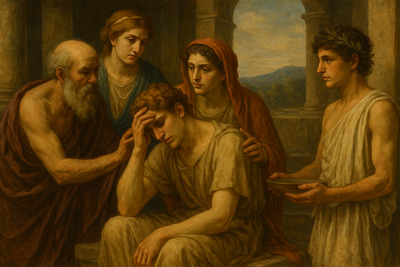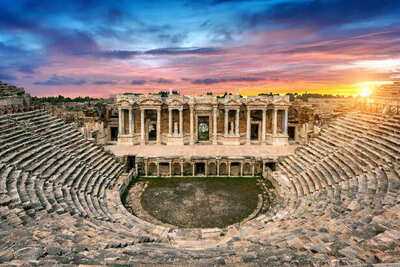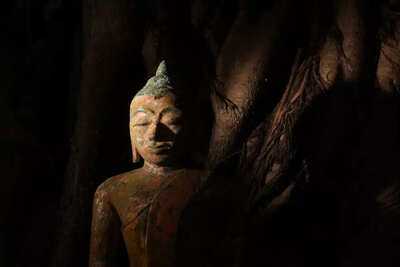How Ancient Civilisations Treated Mental Health
Imagine a world before modern therapy and psychiatry, where most of the world attributed mental illness to supernatural causes like demonic possession or a punishment from the divine. From folk stories to mythology, the modern world listen to the stories of cruel treatment, which include exorcisms, physical abuse and even sometimes execution. Until figures like Philippe Pinel or Dorothea Dix emerged in the 19th century, who led the reform movement and advocated for moral treatment. But the question is, was the world always cruel to people with mental illness in the past? If we go through multiple traditions across the world, we notice that healers throughout history used humours, doshas and meditation to soothe suffering. This article goes through ancient civilisations' treatment of mental health and delves into their similarity.

1. Ancient Greece In ancient Greece, the Hippocratic tradition tried to explain mental illness as an imbalance of four humours, which are blood, phlegm, yellow, bile and black bile. And when an imbalance occurs among them the the body and spirit began suffering. Among these four humour, black bile was associated with melancholia or in our language, depression. Then the healer aimed for treatments to restore the balance by recommending diets, regulated exercise, recommending timing and style of taking baths or in some cases, bloodletting as well. We can say that as of now, modern science has superseded this model.
In ancient Greece, the Hippocratic tradition tried to explain mental illness as an imbalance of four humours, which are blood, phlegm, yellow, bile and black bile. And when an imbalance occurs among them the the body and spirit began suffering. Among these four humour, black bile was associated with melancholia or in our language, depression. Then the healer aimed for treatments to restore the balance by recommending diets, regulated exercise, recommending timing and style of taking baths or in some cases, bloodletting as well. We can say that as of now, modern science has superseded this model.
2. Classical India A fascinating thing is, in India, around that time or little late, Ayurvedic physicians developed a similar framework. They treated the mind or Manas as an integral faculty whose well being depends on the balance of three doṣas known as vāta, pitta and kapha. Texts like manovikāra and unmāda identify a range of mental disturbances that may be caused by poor diet or toxins to emotional upheaval. The healer who recommended therapies, which were pretty holistic, including herbal recommendations, purification procedures to strict sleep advice. You may call these practices counselling. Even in Ayurvedic time they recognised psychosomatic connections long before modern science gave them a name.
A fascinating thing is, in India, around that time or little late, Ayurvedic physicians developed a similar framework. They treated the mind or Manas as an integral faculty whose well being depends on the balance of three doṣas known as vāta, pitta and kapha. Texts like manovikāra and unmāda identify a range of mental disturbances that may be caused by poor diet or toxins to emotional upheaval. The healer who recommended therapies, which were pretty holistic, including herbal recommendations, purification procedures to strict sleep advice. You may call these practices counselling. Even in Ayurvedic time they recognised psychosomatic connections long before modern science gave them a name.
3. Early Buddhist Perspective Buddhist healers approached mental health in a unique way which is a kind of ethical psychology. Their text place suffering or dukkha at the centre of human journey and analyses the mental conditions that can lead to disress as Cetasika which map the unskillful state of mind into greed, hatred and delusion and their antidotes come from mindfulness and compassion. Buddhism offered multiple psychological tools that functioned in the past as therapies for distress.
Buddhist healers approached mental health in a unique way which is a kind of ethical psychology. Their text place suffering or dukkha at the centre of human journey and analyses the mental conditions that can lead to disress as Cetasika which map the unskillful state of mind into greed, hatred and delusion and their antidotes come from mindfulness and compassion. Buddhism offered multiple psychological tools that functioned in the past as therapies for distress.
Common Patterns Across TraditionsPeople address mental Health across the world with clear pattern. It was understood as an imbalance whether you can take therapies of humours, doshas or unwholesome mental states. In traditional treatment healing was always holistic, combining physical remedies, a healthy life guide and most importantly community support. The ancient world teaches us that observation, compassion and balance are timeless. So mental well-being has always been and will always remain a shared human concern.
1. Ancient Greece
2. Classical India
3. Early Buddhist Perspective
Common Patterns Across TraditionsPeople address mental Health across the world with clear pattern. It was understood as an imbalance whether you can take therapies of humours, doshas or unwholesome mental states. In traditional treatment healing was always holistic, combining physical remedies, a healthy life guide and most importantly community support. The ancient world teaches us that observation, compassion and balance are timeless. So mental well-being has always been and will always remain a shared human concern.
Next Story